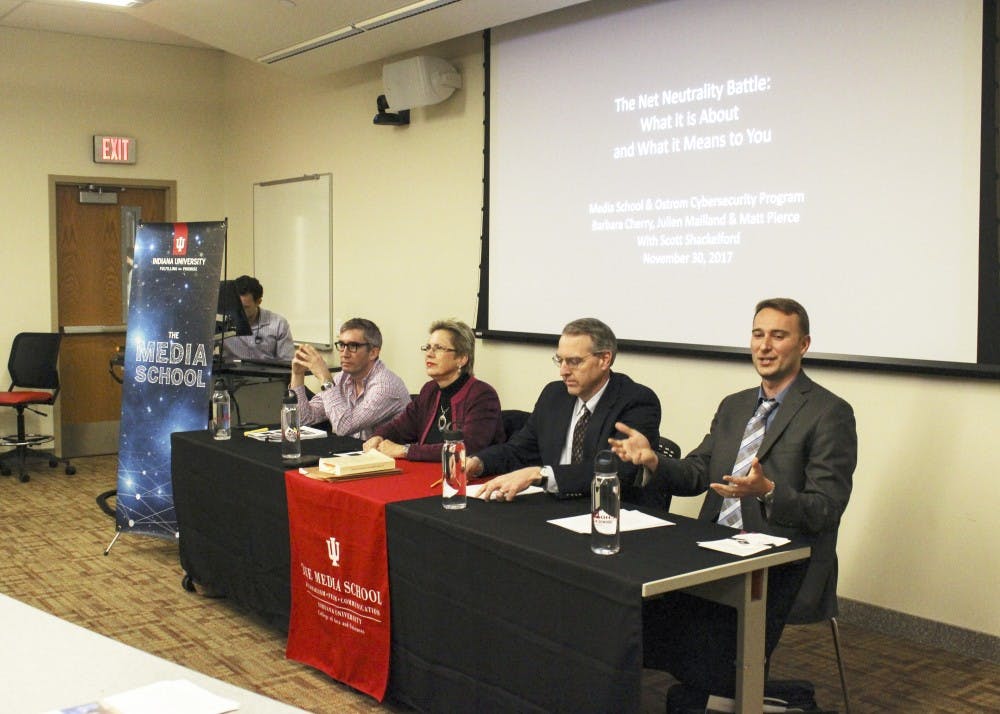When Federal Communications Commission chair Ajit Pai announced plans to roll back net neutrality in the United States, he felt the backlash immediately.
Net neutrality bans internet service providers from discriminating against certain types of content, whether it's through throttling or blocking content for political and competitive reasons.
For example, it’s illegal for Comcast to slow down Netflix to get more people to opt for Hulu, a company it owns, instead.
But it’s not as simple as it sounds. The subject was discussed Thursday night in “The Net Neutrality Battle: What it is About and What it Means to You,” a panel co-sponsored by the IU Cybersecurity Program, Media School and Ostrom Workshop.
IU telecommunications professor Barbara Cherry and assistant professor Julien Mailland sat on the panel, along with Rep. Matt Pierce, D-Bloomington. All three panelists were staunch proponents of net neutrality, discussing the legal future for the internet and what it means for everyday users.
As one political majority leaves the U.S. government and another takes its place, the role of net neutrality usually changes with it.
“It’s a lot like a merry-go-round,” Cherry said.
When Democrats have control of Congress, net neutrality is enforced. When Republicans take their place, broadband services are reclassified, stripping them of regulations.
Since 1996, ISPs have been bouncing between heavy and light regulation. In 2015, the Open Internet Order classified them as telecommunications services under Title II of the Communications Act of 1934, which allows for more FCC intervention.
Cherry, Mailland and Pierce worked together on a research paper that influenced the outcome of this order.
Prior to that, broadband services like AT&T and Comcast were information services under Title I. The main difference between these classifications is how much the FCC can intervene in their business models, telling the companies what’s okay to do and what isn’t.
Pai wants to repeal current rules and bring ISPs back to the way things were before 2015.
People who oppose net neutrality believe regulations stifle innovation. They say the breadth of the free market gives consumers a variety of alternatives if one ISP isn’t providing the desired services.
The panelists talked about possible shortcomings in these decisions and the inevitable legal battles brewing under the surface. They agreed having mechanisms in place to prevent discrimination and promote equal access were necessary to protect citizens and maintain the internet as an open space.
“This proceeding is long in ideology and kind of short on facts,” Pierce said. “Where will the next battles break out? We’ll move onto the next theater of war, which is the courts.”
This legal, economic and political battle prompted questions among the audience in the packed room. One student, IU senior Bryce Ruchman, said he had issues with the enforcement of net neutrality and the one-sided nature of the panel.
“I had a general expectation of objective viewpoints and that we would be able to make decisions for ourselves, rather than being told what to expect,” Ruchman said.
Ruchman said he believes the free markets will promote innovation and encourage people to abandon ISPs that don’t meet their needs or respect the free flow of information. This is a sentiment commonly echoed among detractors of net neutrality, one associated with but not limited to conservatives.
A few parts of Title II concerned him, he said, such as the requirement of ISPs to submit their business models to the FCC and the companies’ inability to overturn any rejections that might come their way. Capital investments are also heavily regulated under these enforcements.
Though Ruchman said he respected the viewpoints of the panelists, he said it’s important for students to pursue and question all sides of the debate.
He said it isn’t necessary for people to go to either extreme to have productive discussions and debates. All they have to do is listen to everything, ask good questions and never stop learning. It's the only way to understand the many facets of hot-button issues like net neutrality.
“To kids who aren’t very informed on the topic, it’s good to hear both sides,” Ruchman said. “I think it’s dangerous for someone to hear only one side of the argument, especially if they’re not informed on the issue.”




